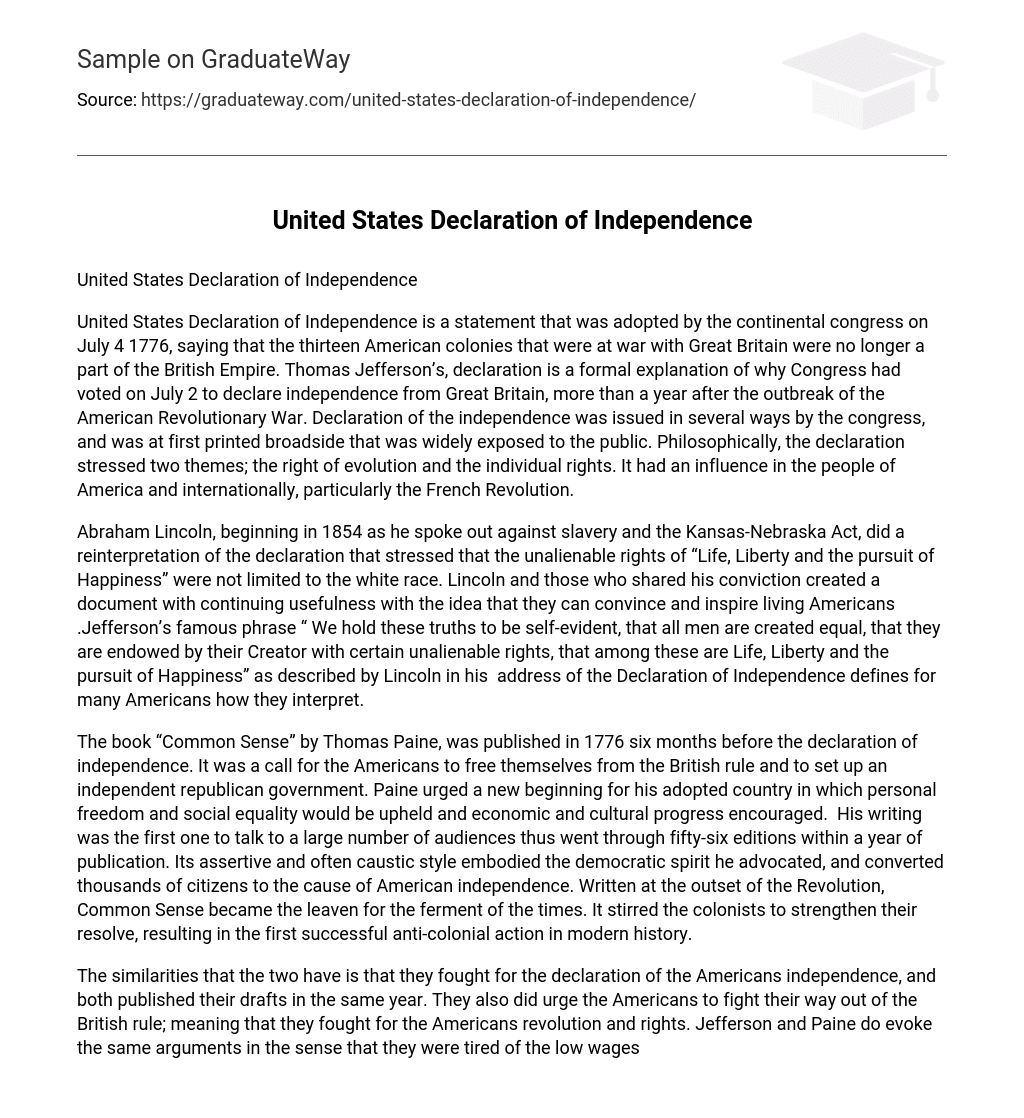United States Declaration of Independence is a statement that was adopted by the continental congress on July 4 1776, saying that the thirteen American colonies that were at war with Great Britain were no longer a part of the British Empire. Thomas Jefferson’s, declaration is a formal explanation of why Congress had voted on July 2 to declare independence from Great Britain, more than a year after the outbreak of the American Revolutionary War. Declaration of the independence was issued in several ways by the congress, and was at first printed broadside that was widely exposed to the public. Philosophically, the declaration stressed two themes; the right of evolution and the individual rights. It had an influence in the people of America and internationally, particularly the French Revolution.
Abraham Lincoln, beginning in 1854 as he spoke out against slavery and the Kansas-Nebraska Act, did a reinterpretation of the declaration that stressed that the unalienable rights of “Life, Liberty and the pursuit of Happiness” were not limited to the white race. Lincoln and those who shared his conviction created a document with continuing usefulness with the idea that they can convince and inspire living Americans .Jefferson’s famous phrase “ We hold these truths to be self-evident, that all men are created equal, that they are endowed by their Creator with certain unalienable rights, that among these are Life, Liberty and the pursuit of Happiness” as described by Lincoln in his address of the Declaration of Independence defines for many Americans how they interpret.
The book “Common Sense” by Thomas Paine, was published in 1776 six months before the declaration of independence. It was a call for the Americans to free themselves from the British rule and to set up an independent republican government. Paine urged a new beginning for his adopted country in which personal freedom and social equality would be upheld and economic and cultural progress encouraged. His writing was the first one to talk to a large number of audiences thus went through fifty-six editions within a year of publication. Its assertive and often caustic style embodied the democratic spirit he advocated, and converted thousands of citizens to the cause of American independence. Written at the outset of the Revolution, Common Sense became the leaven for the ferment of the times. It stirred the colonists to strengthen their resolve, resulting in the first successful anti-colonial action in modern history.
The similarities that the two have is that they fought for the declaration of the Americans independence, and both published their drafts in the same year. They also did urge the Americans to fight their way out of the British rule; meaning that they fought for the Americans revolution and rights. Jefferson and Paine do evoke the same arguments in the sense that they were tired of the low wages that the British colonies were paying the Americans and the way they were treated. The outbreak of the American Revolutionary war made the two of them to declare independence a year later.
I do believe that they both rely on the same set of ideas for justification of independence. Jefferson’s quote “We hold these truths to be self-evident, that all men are created equal, that they are endowed by their Creator with certain unalienable rights, that among these are Life, Liberty and the pursuit of Happiness” is the same as the Paine’s argument that “all men are equal at creation and therefore the distinction between kings and subjects is a false one.”
Paine is more persuasive in the sense that he began by making a distinction between society and government. He said that society is a patron, produced by our wants, that promotes happiness and government is a punisher, produced by wickedness that restrains vices. Paine then goes on to consider the relationship between government and society in a state of natural liberty. He tells a story of a few isolated people living in nature without government. The people find it easier to live together rather than apart and thereby create a society. As the society grows problems arise so all the people meet to make regulations to mitigate the problems. As the society continues to grow government becomes necessary to enforce the regulations, which over time, turn into laws. Soon there are so many people that they cannot all be gathered in one place to make the laws, so they begin holding elections.
This, Paine argues, is the best balance between government and society and he quote “Society is produced by our wants, and government by wickedness; the former promotes our happiness positively by uniting our affections, the latter negatively by restraining our vices. The one encourages intercourse, the other creates distinctions. The first is a patron, the last a punisher. Society in every state is a blessing, but government even in its best state is but a necessary evil.”
Conclusion
Jefferson and Paine played some important roles in the declaration of independence. They both cry for the freedom of the Americans from the British rule. Paine argues that even if Britain was the mother country of America, that made her actions all the more horrendous, for no mother would harm her children so brutally. This argument depicts the love Paine had for hid motherland.
References
Thomas Jefferson. Declaration of Independence, (1984)
Thomas Paine. Common Sense, Published by Penguin, (1982)





